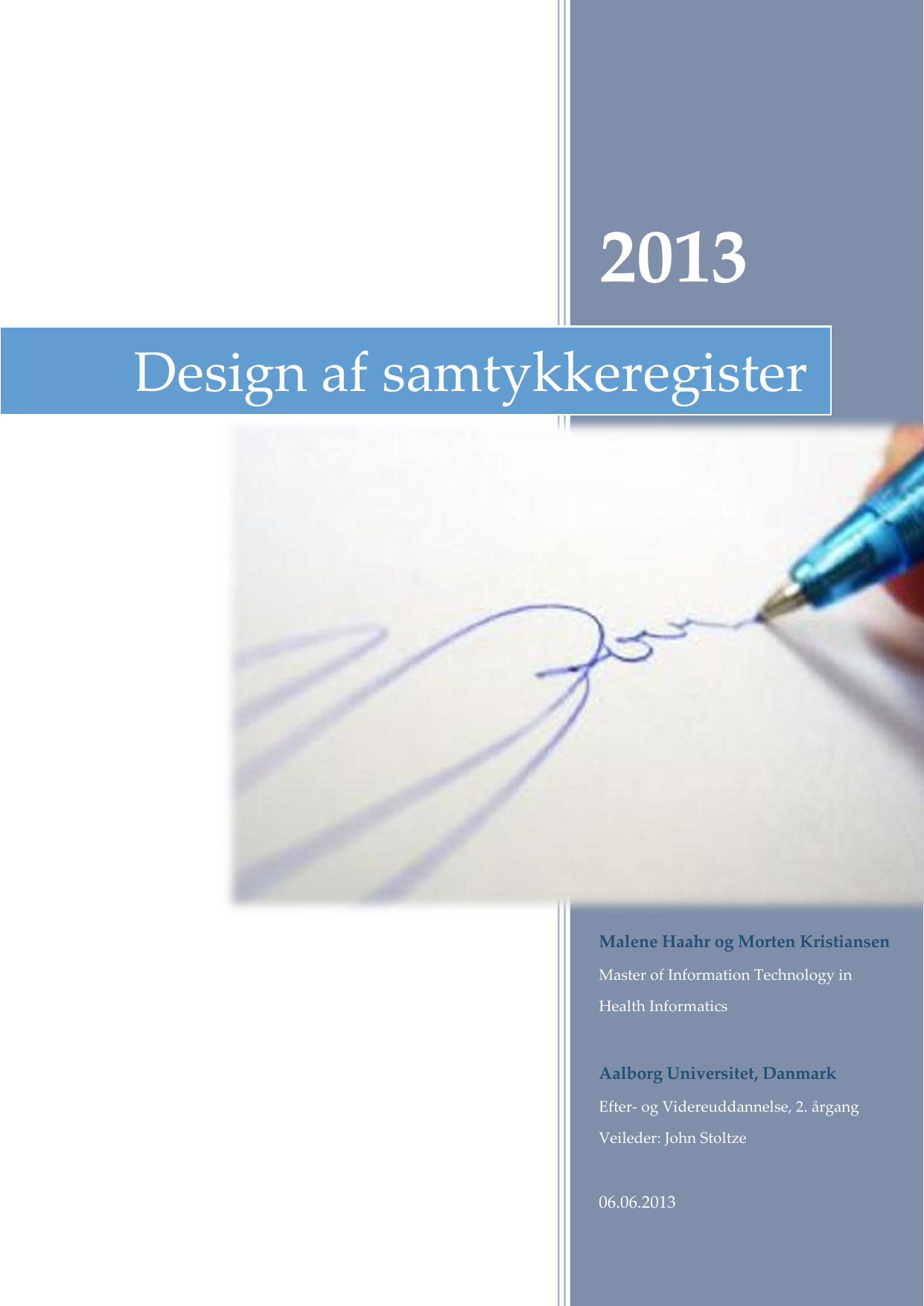
Design af samtykkeregister
Oversat titel
Forfattere
Semester
2. årgang
Udgivelsesår
2013
Afleveret
2013-06-04
Antal sider
275
Abstract
Der har længe i Danmark været fokus på samling og deling af helbredsoplysninger, og flere sundhedspersonaler har via revision af Sundhedsloven i 2011, fået adgang til opslag i borgernes sundhedsoplysinger. Borgerne skal selv tage initiativ til at nægte samtykke til opslag og deling af egne helbredsoplysninger. Borgernes mulighed for at angive negativt samtykke og begrænse indsyn i egne helbredsoplysninger varierer alt efter hvilket it-system borgerens oplysninger befinder sig i, og indhentning af samtykke sker ofte på papir lige inden behandling starter op. Borgernes retsstilling i forbindelse med selvbestemmelses over hvem der skal have adgang til ens oplysninger, efterleves ikke i sundhedsvæsenet i dag. Den fortrolighed der bør være omkring borgernes helbredsoplysninger synes under pres. Hvordan efterlever vi den fortrolighed, tillid og troværdighed som der bør være mellem borger og sundhedsvæsen? Vi ønsker at undersøge om det er muligt at designe et samtykkeregister med fokus på borgeren. Vil vil komme med en vurdering af om et samtykkeregister vil give borgerne og sundhedsperosnalet en bedre håndtering af de retmæssige samtykker i forbindelse med opslag og deling af helbredsoplysninger, end vi set det idag. Ovenstående problemstilling undersøger vi med udgangspunkt i afklaring af samtykke håndtering i tre forskellige systemer. Vi har valgt at tilgå problemstillingen med hovedsagelig kvalitative metoder, som interview, spørgeskemaundersøgelse, analyse af dokumenter og produktkataloger. Med udgangspunkt i Müllers teknologiforståelse vil vi se nærmere på de arbejdsgange og processer der er omkring håndteringen af borgernes samtykke. Netop borgeren er vores fokus i denne undersøgelse, og vi vil med brug af Grounded Theory danne vores egen teori og forståelsesramme om borgerens muligheder og behov i forbindelse med afgivelse af negativt samtykke. På baggrund af analysen vil vi diskuterer vores fund ud fra de fire områder i Müllers teknologiforståelse. Diskutionen vil tage udgangspunkt i tre niveauer, nemlig individ-, organisations- og samfundsniveau. Med brug af Activity Theory vil vi belyse de subjektive handlinger i arbejdsprocesser ved afgivelse af negativt samtykke. Diskution og fund fra analysen danner grundlag for design af et samtykkeresiter, der præsenteres sammen med en afsluttende vurdering af om et register hvor borgerens selv kan registrere egne samtykker, vil give borgerne og sundhedsperosnalet en mere fornuftig håndtering af de retmæssige samtykker i forbindelse med opslag og deling af helbredsoplysninge.
Focus on collection and sharing of health information has for a long time been a focus point in Denmark. More health care providers have, through the revision of the Sundhedsloven in 2011, gained access to entries in public Health information. Citizens must take the initiative themselves to refuse consent to entry and sharing of personal health data. The possibility for citizens to specify negative consent and limit possible view of the personal health data varies, and obtaining consent is often done on paper just before treatment starts up. Citizens legal position in relation to self-determination of who should have access to their health information, are not observed in health care today. The confidentiality there always should be about public health information appears under pressure. How can we relive and restore the confidentiality, trust and credibility which should always be between citizens and health care? We want to investigate whether it is possible to design a consent register with a focus on citizen. We want to make an assessment of whether a consent registry will give citizens and health care providers a better management of the lawful consent to the entry and sharing of health information, than we have seen it today. We will examine the basis of clarifying the consent handling in three different systems. We have chosen to access the problem with mainly qualitative methods, like interviews, questionnaires, analysis of documents and product catalogs. Based on Müller's technology understanding we will look at the procedures and processes that are about the handling of citizens' consent. The individual in particular, is our focus in this study, and we will be using Grounded Theory to form our own theory and framework of an understanding about the citizen's opportunities and needs in order to submit a negative consent. Based on the analysis, we will discuss our findings from the four areas of Müller's technology understanding, and the discussion will be based on three levels: individual, organizational and societal level. With the use of Activity Theory, we will elucidate the subjective actions in workflows by delivering negative consent. Discussion and findings from the analysis will form the basis for the design of a consent register, presented along with a final assessment of whether a register where citizens can register their own consents will give citizens and health care providers a more sensible handling of the rightful consents in connection to entry and sharing of personal health data.
Emneord
